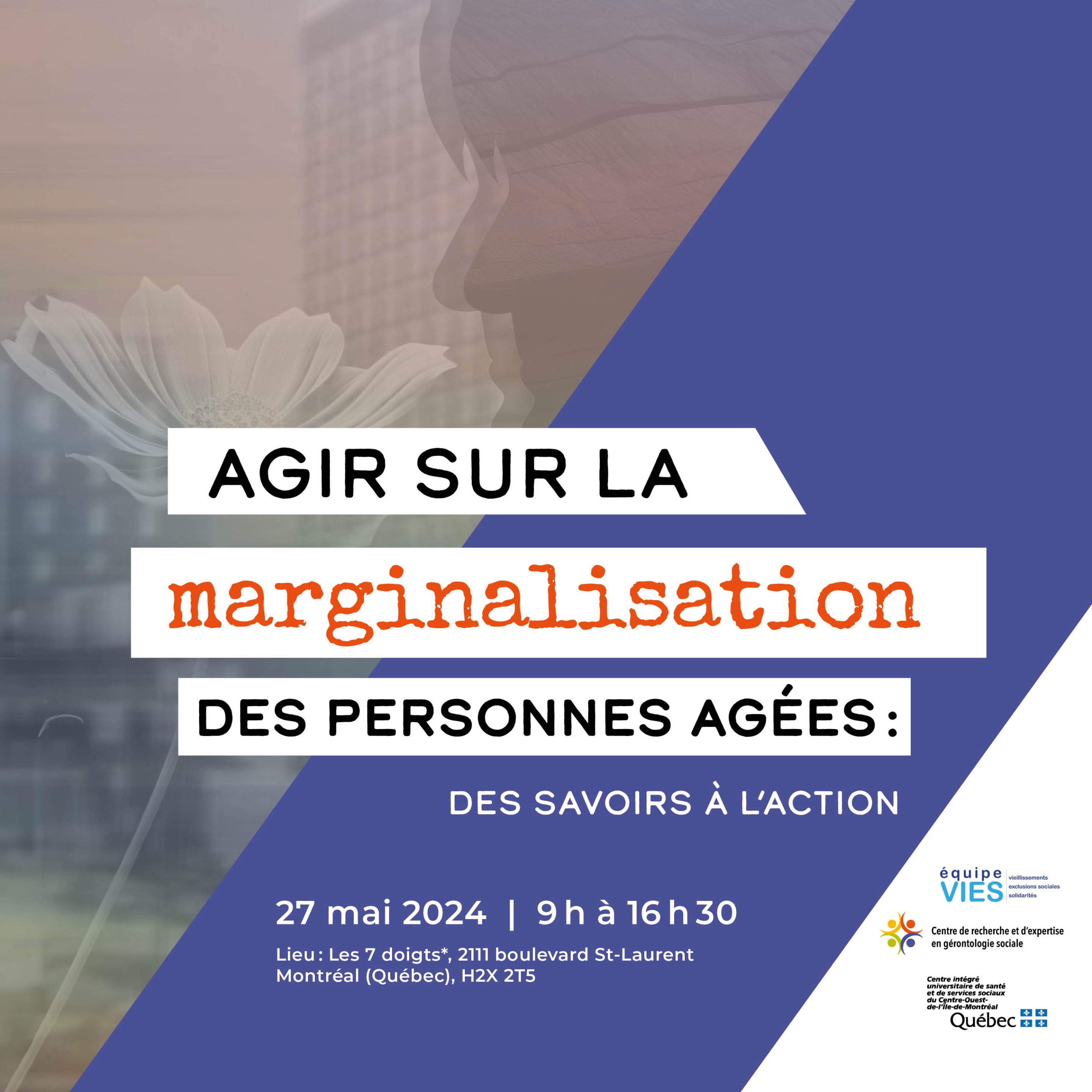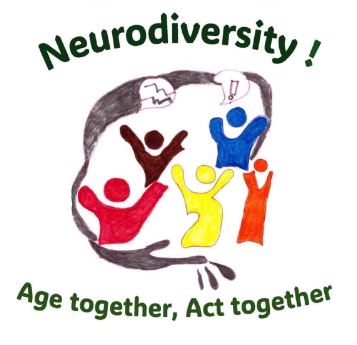
On May 27, 2024, CREGÉS held its annual symposium entitled Agir sur la marginalisation des personnes âgées: Des savoirs à l’action. This interdisciplinary event presented the research results of three CREGÉS projects dealing with the exclusion and marginalisation of older adults.
This page presents recordings of the discussions, performance and lectures that were made up the symposium. You will also have access to a series of infographics and policy briefs made as part of the symposium, which summarize the three research projects presented. These materials were prepared by CREGÉS student members: Katarzyna Skorek, a student supervised by Hélène Carbonneau, Sarah Thompson, research assistant on the project Les actions gouvernementales au Québec : impacts sur des personnes aînées marginalisées ou vivant des dynamiques d’exclusion sociale, and Sophie Koestner, a student under the supervision of Shari Brotman.
These were the three main projects presented at the symposium by their principal investigators:


Led by Shari Brotman, CREGÉS researcher and professor at McGill University

Led by Hélène Carbonneau, CREGÉS researcher and professor at Université du Québec à Trois-Rivières


Led by Patrik Marier, CREGÉS scientific director and professor at Concordia University and Meghan Joy, CREGÉS researcher and professor at Concordia University
Project Discussions
In the morning, Eugénie Émond, a journalist specialising in social gerontology, moderated discussions with several members of the three research teams. You’ll find these grouped by subject below.
“What I understand after 10 years of intersectional narrative research is that when we talk about marginalisation, we always talk about the challenges that this population faces. But when we talk to people, they tell us about their strengths, their activities, their pride. We only talk about their problems and not their strengths, their resilience, and that’s the problem with the system.”
-Shari Brotman
Shari Brotman and Laura Pacheco
Presentation of the project: The Experiences of Social Exclusion and Inclusion Among People Aging with Neurodiversity and Their Families with principal investigator, Shari Brotman (Associate professor at McGill University’s School of Social Work and CREGÉS member ), and her co-investigator Laura Pacheco (Assistant Professor, School of Social Work, Memorial University and Adjunct Professor, School of Social Work, McGill University). (at 0:22:07)
“That’s the message I want us to hold onto: that together we can ensure that a person can live well, and living well in the community does not necessarily mean performing well, it means being there, having a place, feeling loved, feeling accepted, feeling that you belong…”
-Hélène Carbonneau
Hélène Carbonneau
Presentation of the project: Participation sociale des aînés faisant face à des dynamiques de marginalisation et d’exclusion, développement d’outils d’intervention pour soutenir leur inclusion en milieu communautaire de loisir : une recherche-action with principal investigator Hélène Carbonneau (Regular researcher, CREGÉS; Full Professor, Études en loisir, culture et tourisme, Université du Québec à Trois-Rivières). (at 1:22:00)
“When we have political programs linked to decentralization, we need to really understand the inequalities between cities and even between neighborhoods. Like here in Montreal, with the recent MADA plan, we can see that there are inequalities between neighborhoods, but what exactly are we doing? I think that’svery important to understand.”
-Meghan Joy
Patrik Marier and Meghan Joy
Presentation of the project: Les actions gouvernementales au Québec : impacts sur des personnes aînées marginalisées ou vivant des dynamiques d’exclusion sociale with principal investigator, Patrik Marier ( Scientific Director, CREGÉS; Full Professor, Department of Political Science, Concordia University), and his co-investigator, Meghan Joy (Regular researcher, CREGÉS; Associate Professor, Department of Political Science, Concordia University). (at 0:49:25)
“If we want to understand the experience of older immigrants, we have to keep in mind that there can be many different experiences. Just know that 40% of older people in Montreal are immigrants[…]. Today, they can have a wide variety of immigration statuses: from very secure as permanent residents or citizens, to very precarious statuses as asylum seekers or undocumented.”
-Jill Hanley
Jill Hanley and Julien Simard
Discussion with Jill Hanley, professor at McGill University’s School of Social Work and scientific director of SHERPA, and Julien Simard, postdoctoral researcher at CRÉMIS, on immigrant and precarious-status older adults and navigating government resources as part of the project Les actions gouvernementales au Québec : impacts sur des personnes aînées marginalisées ou vivant des dynamiques d’exclusion sociale. (at 1:41:10)
“The administration and the practitioners need to be trained because these are the people who will ensure long-term sustainable change with policies, regulations, training, good exchange practices, how to work with a trans person, how to fight prejudice…”
-Laurent Breault
Laurent Breault
Discussion with Laurent Breault, Executive Director of Fondation Émergence, on LGBTQ+ older adults as part of the project Les actions gouvernementales au Québec : impacts sur des personnes aînées marginalisées ou vivant des dynamiques d’exclusion sociale. (at 2:01:35)
Click here to download the infographic mentioned in Laurent Breault’s talk
“What do you get when you put someone in an institution for life? What do you get if you keep someone in a private place? You take away all their autonomy, and what do you get when they’re old and back in the community?”
-Michel Gagnon
Michel Gagnon
Discussion with Michel Gagnon (Maison Cross Roads) on older adults in the legal system as part of the project Les actions gouvernementales au Québec: impacts sur des personnes aînées marginalisées ou vivant des dynamiques d’exclusion sociale. (at 2:20:17)
Performance: Neurodiversity! Age together, Act together
La Gang à Rambrou and Sans Oublier le Sourire, two community-based organizations working with neurodiverse people, joined forces to highlight the life experiences of the 21 people aging with neurodiversity aged 45+ who were interviewed as part of the research project in Montreal and Quebec City. Drawn directly from the quotes of neurodiverse older adult participants, their stories took shape on stage in words and movement through artists who are themselves aging with neurodiversity. At times poetic, at times poignant, the performance leads us to think about what it means to age with neurodiversity, highlights strengths and resilience, and examines the challenges facing this community within schools, workplaces, the health and social service system, housing, and in society in general. It also includes important themes related to: identity, strength and resilience, mental health and addictions, mistreatment, lack of control over daily life, caregiving, and the important role of community organizations.
Artists: members of Gang à Rambrou and Sans Oublier le Sourire
Choreographer and director: Jasmine Allan-Côté
Choreographer and artist-mediator Jasmine Allan-Côté shares her love of movement with dancers and non-dancers of all ages. She carries out many collaborative artistic projects, including several with people with special needs. She has been a member of La Gang à Rambrou’s team of artist-mediators since 2021.
Oral Presentations
The afternoon presentations, given by CREGÉS members and partners, provided a unique opportunity to deepen understanding of the issues facing marginalised older people. With topics ranging from homelessness to the experiences of LGBTQ+ people, from neurodiversity to justice, each presentation enriched the dialogue and broadened perspectives. These exchanges enabled participants to gain a better understanding of the complex and often invisible realities of these groups, while fostering the sharing of expertise and awareness essential to building a more inclusive society.
Les personnes âgées judiciarisées : de la connaissance à la mise en œuvre de programmes et services résidentiels adaptés
-
Michel Gagnon, SW, Member of the Board of Directors, Maison Cross Roads
Summary:
Through his professional career and the experience he has gained over the past 20 years at Maison Cross Roads, a non-profit community organization that provides reintegration programs for people in conflict with the law, Michel Gagnon notes the growing number of people aged 50 and over in the justice system in Canada:
One of the issues that was difficult to articulate and address has been older incarcerated people. None of us had any expertise and we didn’t really know what to do with these people. So, at that point I got in touch with the Correctional Service of Canada to apply for funding for Service Oxygène, a liaison service for older people in conflict with the law.
Using real-life examples, Michel Gagnon summarizes the difficulties of adjustment that this population can experience when they leave prison (fear of life in society, social alienation and isolation, hypervigilance, doubt and interpersonal mistrust, reduced self-esteem and sense of worth, inability to make decisions for themselves, etc.).
Presented as part of the project Les actions gouvernementales au Québec : impacts sur des personnes aînées marginalisées ou vivant des dynamiques d’exclusion sociale
Conséquences du mirage du système de santé et des services sociaux sur les personnes âgées en situation d’itinérance
-
Diandra Serrano, Master’s student in Couple and Family Therapy Program, McGill University; Research assistant, McGill University
-
Marianne Bordeleau, Doctoral student in clinical psychology, Université du Québec à Montréal ; Research assistant, McGill University
Summary:
Marianne Bordeleau and Diandra Serrano present the findings of a qualitative study exploring the impact of the health and social services network on the experiences of older people experiencing homelessness. The study highlights, through two main themes, the complex and subtle ways in which the health and social services system impacts on the lives of older people experiencing homelessness. The aim was to understand how older people experiencing homelessness think about and experience their care needs. The findings show that these people describe the health and social services system as a process of systemic oppression, in both community and public settings. They describe how the system they turned to for care subjected them to despair and belittling and forced them to remain in a survival state. Using quotes from real-life experiences, the researchers also explain how the care system cuts off participants’ ability to imagine a future.
Presented as part of the project Les actions gouvernementales au Québec : impacts sur des personnes aînées marginalisées ou vivant des dynamiques d’exclusion sociale
Politiques publiques et l’exclusion sociale des personnes âgées à risque de marginalisation
- Meghan Joy, Associate Professor, Department of Political Science, Concordia University
- Sandra Smele, Coordinator, Inclusive Aging, Diversity, Health and Well-being (IDSB), CREGÉS
Summary:
Sandra Smele and Meghan Joy present an analysis of public policies to better understand how these policies support (or do not support) the ability of marginalized older adults to age in place. One of the reasons for this research is the province’s concern to better understand the realities of older people at risk of marginalization. Meghan Joy supports the importance of this by explaining that these policies apply to a diverse group of older people in different areas with different municipal policies. Some general findings on the treatment of aging were raised before introducing more detailed observations. Generally, aging is considered a challenge and policies advocate “active aging.” Marginalized older adults are not mentioned at all or their needs are only vaguely considered. Finally, the two researchers suggest solutions for the policies on aging in place and age-friendly communities. These include clearer coordination with the non-profit sector, clearer relationships between partnerships and the government, better coordination between the municipal and provincial government to facilitate action, and further research into policies on inequality.
Presented as part of the project Les actions gouvernementales au Québec : impacts sur des personnes aînées marginalisées ou vivant des dynamiques d’exclusion sociale
No video is available for this presentation
Le rapport des personnes aînées gaies et lesbiennes aux services et aux ressources formelles
- Julie Beauchamp, Regular researcher, CREGÉS; Assistant Professor, Département de psychiatrie et de neurosciences, Faculté de Médecine, Université Laval
Summary:
Julie Beauchamp presented the preliminary findings of the project Les actions gouvernementales au Québec : impacts sur des personnes aînées marginalisées ou vivant des dynamiques d’exclusion sociale, presented earlier by Patrik Marier and Meghan Joy. Qualitative research was conducted with four focus groups and three individual interviews with a total of 18 participants to document the problems of accessing formal services and resources for LGBT older adults. A number of issues, supported by the literature and preliminary findings, were raised to suggest possible solutions. These included the importance of considering and recognising the chosen family in the care continuum, the importance of training practitioners about the needs and realities of LGBT seniors, particularly in remote areas, and the importance of raising the profile of LGBT older adults. The intersection of older adults and LGBTQ communities should be considered, including the development of collaborative partnerships and access to resources for avoiding isolation. Possible solutions included the availability of new spaces through different initiatives and making mixed spaces more welcoming through an intersectional approach.
Presented as part of the project Les actions gouvernementales au Québec : impacts sur des personnes aînées marginalisées ou vivant des dynamiques d’exclusion sociale